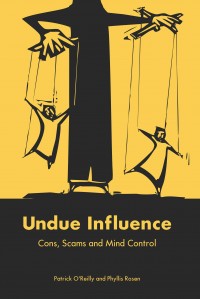 In June 2014, I spent two weeks teaching day-long Continuing Education Unit (CEU) seminars on Undue Influence to psychotherapists from four different states. The course was based on the book I co-authored, Undue Influence: Cons, Scams and Mind Control. Teaching the seminars was a gratifying experience and I met remarkably intelligent, friendly, knowledgeable and interesting people. The training provided the historical background and the techniques and vulnerabilities of undue influence. Areas covered in this training included distractibility, lies and liars, psychopathy, heuristics, framing, prospect theory, the risky shift, social proof, the affect-as-information hypothesis, fear, low self-esteem, loneliness, cognitive dissonance, pattern seeking, magical thinking and hot and cold reading. The final two sections of the training focused on elder abuse and cults.
In June 2014, I spent two weeks teaching day-long Continuing Education Unit (CEU) seminars on Undue Influence to psychotherapists from four different states. The course was based on the book I co-authored, Undue Influence: Cons, Scams and Mind Control. Teaching the seminars was a gratifying experience and I met remarkably intelligent, friendly, knowledgeable and interesting people. The training provided the historical background and the techniques and vulnerabilities of undue influence. Areas covered in this training included distractibility, lies and liars, psychopathy, heuristics, framing, prospect theory, the risky shift, social proof, the affect-as-information hypothesis, fear, low self-esteem, loneliness, cognitive dissonance, pattern seeking, magical thinking and hot and cold reading. The final two sections of the training focused on elder abuse and cults.
I decided to use Jim Jones, Peoples Temple and Jonestown as my example of a cult and the ways people are gradually indoctrinated into an organization that ultimately is anathema to what they once believed. Jonestown was perfect as an example for three reasons: everybody knows about Jonestown, Jim Jones encapsulated exactly how a cult leader operates, and finally, Peoples Temple/Jonestown ended in a truly horrific fashion.
One thing did puzzle me about this teaching experience, though, and that was that in the first couple of trainings, I continued hear the phrase “drank the Kool-Aid” from participants. Although I had encountered this phrase when I taught a doctoral course on Undue Influence a few years ago, I was surprised to hear it from experienced psychotherapists. I am resigned to the fact that the phrase has become part of the American lexicon, even when the people who use the terms don’t really know what it means, and now that I’m paying attention, I hear it pop up in the most unusual places.
On June 27, for example, as Bill Maher was introducing the topic of climate control to his panel, he said: “We’ve had a hallelujah moment because we found out this week that not all Republicans have drunk the Kool-Aid on climate change.” And in the movie The Devil Wears Prada, the character played by Adrien Grenier says to Anne Hathaway: “Looks like someone’s been drinking the Kool-Aid,” in reference to her character buying into the whole fashion world.
Although it’s probably a losing battle, I continue to correct people when I hear the phrase, and following my experience in the first two seminars, I prefaced the section on cults by bringing this phrase to the attention of the attendees. I explained to the psychotherapists that “drink the Kool-Aid” has found its way into common usage but really it’s a discriminatory phrase based on ignorance. It minimizes the horrible treatment the Jonestown residents were daily subjected to, and the phrase defames the memory of those 917 people murdered by Jim Jones. People who say “drank the Kool-Aid” so flippantly really have no sense of the degradations those murdered people endured and by using the term, they trivialize and caricature the victims. I also noted that the phrase make no allowances for the Jonestown residents’ intrinsic decency and their dedication to their belief that they were creating a selfless, egalitarian society. I told the psychotherapists that they were in the enviable position of actually being shown and taught what happened on November 18, 1978. By the time the subject of cults came up, the psychotherapists attending this CEU seminars had already spent four hours learning about Undue Influence and knew the techniques – which are really pretty generic – that Jones used and the vulnerabilities he looked for in their victims.
Following this short introduction, I focused the next hour on Jim Jones, Peoples Temple and what actually happened to those decent people on that horrible night. At the conclusion of each training, I spoke to many of the people who attended, and none of them brought up the subject of “drank the Kool-Aid” at the end of the day. I have no way of knowing, of course, but it is my hope and more than tenuous belief that the psychotherapists who attended these trainings will never say “drank the Kool-Aid” and just might educate the next person they hear say it.
(Patrick O’Reilly is a clinical psychologist in California and an Assistant Clinical Professor of Psychiatry at the University of California, San Francisco School of Medicine. He was the postdoctoral intern of the late Dr. Margaret Singer and is the co-author of Undue Influence: Cons, Scams and Mind Control, published by Bay Tree Publishing in January 2014. His complete set of writings for this site is here. He can be reached at oreillyphd@hotmail.com.)